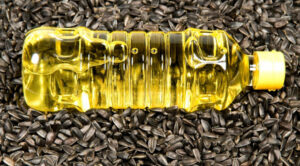
Over the past week, the prices for sunflower oil in Ukrainian ports increased by $5-10 per ton on CPT-port terms due to the shortage of the product both in Ukraine and on the world market, APK-Inform news agency reported.
“In Ukrainian ports, the demand prices for sunflower oil increased by $5-10/ton on CPT-port terms over the week, due to a small number of offers of this product and a similar trend in the global vegetable oil market,” the agency said in a statement.
As of May 10, the demand prices for sunflower oil were reported mainly in the range of $810-820/ton CPT-port, analysts said.

The exports of sunflower oil from Ukraine in September-April of 2023-2024 marketing year (MY) totaled over 4.4 mln tonnes, up 17% compared to the same period of the previous season, and became the second largest export volume in the history after 2019-2020 MY, when the exports reached 4.49 mln tonnes in the same period, APK-Inform news agency reported.
“The demand for this product in the current season from the key global importers was boosted by the more attractive price of sunflower oil compared to other vegetable oils, which resulted in the active increase of sunflower processing by the Ukrainian plants,” the analysts explained.
They also pointed out that an important factor is ensuring relatively stable shipments of oil by sea.
The agency’s experts reminded that they estimated the export of sunflower oil for the season-2023/24 at 5.6 mln tonnes (+4% compared to April estimates; -1% compared to 2022-2023 MY). However, given that about 79% of the forecast has already been exported, a significant decline in monthly shipments is expected by the end of the season.
“The decrease of the exports of the product in May-August of the current season may be due to the decrease of sunflower crushing amid the depletion of the stocks, which are estimated as the minimum for the last three seasons in the whole country as of the beginning of May”, – summarized APK-Inform.

In the third quarter of fiscal year 2024, Kernel processed 816 thousand tons of sunflower seeds, up 10% year-on-year.
According to the company’s announcement on the Warsaw Stock Exchange on Tuesday, six crushing plants of the agricultural holding operated at almost full capacity, while two plants were idle due to the proximity to the Russian border and the war zone.
In addition, at the end of February, Kernel started commissioning the Starokonstantinovka oilseed processing plant in Khmelnytsky region. At the time of writing, the plant has reached over 90% of its processing capacity at the commissioning stage. The plant is expected to be fully operational by May 2024 and reach its maximum processing capacity of 1 million tons of sunflower seeds annually.
At the same time, sales of sunflower oil in January-March 2024 increased by 44% year-on-year to 394 thsd tonnes, totaling 1,103 thsd tonnes in 9M2024.
Sales of bottled sunflower oil in the third quarter of FY2024 amounted to 5% of total sales (19 thousand tons).
Kernel emphasized that the volume of loading of the group’s granaries in the third quarter of fiscal year 2024 was at a seasonally low level – 254 thousand tons, which amounted to 2.7 million tons for 9 months of fiscal year 2024, which corresponds to the same period last year.
The export terminal’s transshipment volume for the reporting period increased to 2,464 thsd tonnes of grain, sunflower oil and meal, which showed a 2.3-fold increase. This was driven by consistent export activity via the Black Sea, increased volumes of sunflower oil produced, transshipment through port terminals acquired earlier in the season, along with the provision of transshipment services to third parties.
Despite the high transshipment volumes of the terminals, the volume of grain exports from Ukraine in January-March amounted to 1.877 thousand tons, which is 2.3 times more than in the same period last year, the company stated.
Before the war, Kernel Agro Holding was the world’s leading producer of sunflower oil (approximately 7% of global production) and its exports (approximately 12%). It is one of the largest producers and sellers of bottled oil in Ukraine. In addition, it is engaged in the cultivation and sale of agricultural products.
Kernel’s net profit for FY2023 amounted to $299 million, while the company ended the previous year with a net loss of $41 million. The agricultural holding’s revenue for FY2023 decreased by 35% to $3.455 billion, but EBITDA increased 2.5 times to $544 million.
In the first half of FY2024, Kernel’s net profit fell 3.6 times compared to the first half of FY2023, to $102 million, and EBITDA halved to $223 million, with revenue down 16% to $1.59 billion.

Moldovan Agriculture and Food Minister Vladimir Bola will meet on Monday with sunflower seed producers and processors due to the difficult situation in his country with sunflower oil production. According to the Moldovan news agency Infotag, the decision to discuss the problem was made after Floarea Soarelui, the largest oil producer, shut down two plants. The producers said they had no raw materials, as farmers refused to sell their seeds at the current market price, and sunflower imports are strictly licensed.
“Today, Moldova’s sunflower seed stocks are about 350 thsd tonnes, so any statements about lack of stocks are speculation. At the same time, the pricing policy should be objective, fair and responsible towards the end consumer,” Bola wrote on Facebook.
He emphasized that “by abandoning political statements and relying solely on the economic component,” the Ministry of Agriculture of Moldova will provide a platform for dialogue between seed producers and processors.
“Each party will provide real figures so that we can make decisions and find viable solutions for the new sunflower harvest,” Bola said.
As reported, Moldova has extended the licensing of sunflower seed imports from Ukraine for three months.

Demand and prices for Ukrainian sunflower oil are growing on the global market, with prices rising by $30-38 per tonne over the past week, APK-Inform news agency reported based on its own monitoring.
“The Ukrainian export market of sunflower oil was dominated by the price growth amid similar trends in the global vegetable oil market. Thus, the demand prices for Ukrainian sunflower oil in the ports reached the maximum since the beginning of the season-2023/2024 and as of March 18, they are mainly fixed in the range of $780-795/ton CPT port. This is $30-38/ton higher than the prices of the previous week,” the analysts said.
In addition, last week the exports of sunflower oil increased to 156 thsd tonnes. This is 9% higher than the previous week, according to APK-Inform.

The competition between Ukrainian and Russian sunflower oil on the global market in 2023/24 MY will be very high, especially on the markets of India, China, Asia and Africa, said Viktoriia Blazhko, the Head of the Black Sea Agricultural Markets Department of APK-Inform, at the XXI International Conference Fat&Oil Industry-2023.
According to her, Ukraine remains the world’s largest exporter of sunflower oil, despite the disruption of the supply chain. However, Ukraine’s share in the global exports is decreasing due to the increase in sunflower oil exports from Russia.
“Russia’s pressure is increasing… Russian products exert pressure by improving quality, price and increasing sunflower production,” the expert explained.
She emphasized that the main “battlefield” in this confrontation is India and China, other countries of Asia and Africa.
“Russia is becoming the main supplier of sunflower oil to China… The Chinese are interested in Ukrainian oil, but they will buy it only from Ukrainian ports, shipped from ports. As for India, Ukrainian products retain their market share, but the pressure from Russia is increasing,” emphasized Ms. Blazhko.
She also drew attention to the important news for the market about the ban on imports of vegetable oils by Iran starting from October 23. Iran is a major buyer of Russian sunflower oil. All the products shipped to this country will end up on the global market and put additional pressure on the export of products from Ukraine.